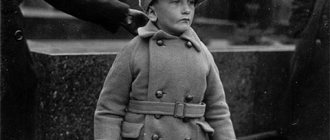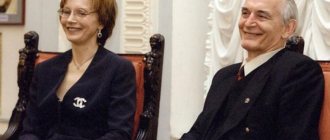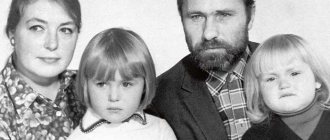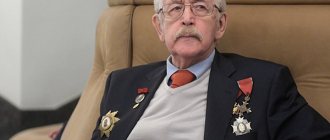Vasily Barkhatov: biography and the beginning of the journey
Everyone knows that almost all famous people’s childhood had little to do with their future profession. Vasily was born into a family of journalists in 1983. Birthday – July 29th. In general, his childhood was similar to that of an ordinary city boy. Like everyone else in the neighborhood, he played, swam in the river, built treehouses, and jumped in garages. In general, nothing remarkable. However, his parents are intellectuals, and therefore believed that the child should receive a certain “cultural minimum.” So the boy ended up in a music school. Initially, the guitar was chosen as the instrument for Vasily Barkhatov. According to my mother, this is a beautiful item that looks romantic. During the qualifying review, it became clear: the parent’s dreams would not come true. The boy's arms were short for a guitar. That's how he ended up in the balalaika class. He received his secondary musical education on this instrument.
University years
After graduating from regular and music schools, Vasily Barkhatov did not plan to connect his life with opera. Especially with directing an opera. He explains his choice simply. One meeting changed everything. Her name was Rosetta Yakovlena Nemchinskaya, and she was a professor of the musical department of GITIS. The meeting with the future star happened by chance: she selected anyone who wanted to take her course, while her colleagues preferred people with experience. And Vasily Barkhatov at this time was worried about the question of how to get away from the army. He began studying with Nemchinskaya, and at the age of 16 he successfully entered the faculty of directing and craftsmanship.
“The world practice is this: nothing stays in the repertoire for years”
— Vasily, at your press conference on the occasion of the master class at KazanOperaLab, there was a kind of healthy pessimism about the prospects for the emergence of modern Russian opera on a serious theatrical stage...
— I always respond very easily to such projects, this is probably the only thing that can lure me, because I am not a lecturer who gives lectures left and right or conducts some kind of master classes.
I don’t have a special gift, I can share, but I’m unlikely to teach. But I really liked the idea of KazanOperaLab, since I myself went through this as a student, graduating from GITIS and watching the experiments of Kirill Serebrennikov with Teodor Currentzis, when they began to draw people’s attention to modern Russian opera to “Vin, much before all these powerful projects.
And then I myself tried to make the “Operational Group” (a laboratory of modern opera organized by Barkhatov in 2012 - editor’s note). The main idea of my laboratory was the following - to return the opera from Bori Filanovsky’s Homeless Opera (the “Homeless Opera” project - editor’s note) back to the theaters.
And then, thank God, I was supported by both the Ministry of Culture and the leading theaters themselves, which, in principle, largely resolved both financial and administrative issues at that time.
Vasily Barkhatov: “Opera is music, not stage directions to it...”
— But the “Task Group” has already become history... Did you manage to at least partially solve the assigned tasks?
— This was partially successful because Lera Auerbach’s opera “The Blind” was staged on the Small Stage of the Stanislavsky Theater, it remained in the repertoire and was performed a certain number of times. But this takes into account the fact that world practice is such that nothing remains in the repertoire for years.
Having worked there, I understand that there is a stagione system, where they simply play, for example, 13 performances in a period of one to four months, and then the production is forgotten or, if it is a co-production, it is transferred further to other theaters.
And only after some years can a renewal occur. Or there is a repertory theater, but even here a certain number of performances are performed within the repertoire, and after some time they are also filmed. That is, in principle, “The Blind” was performed exactly the same way as it would have been staged in any theater.
And the opera “Francis” by Seryozha Nevsky eventually received the “Golden Mask” - and it also took enormous effort to resume this performance, and it was on the stage of the Bolshoi Theater. It seems to me that nothing like this ever happened there either before or after.
It is clear that there were operas of the 20th century (Weinberg and so on), but, in my opinion, there was nothing modern. The most interesting thing is that, if you count the rehearsal and the premiere, “Francis” was performed four times to full houses at the Bolshoi Theater. It's really cool, and there were completely different people in the room.
I always remember one episode: after the general run-through, two such modest women approached me and began a dialogue that frightened me from the first sentence. Then there was no such obscurantism as there is now, but some things already caused a desire to group in anticipation of a blow...
They said: “We are deeply religious...” And it is clear that the opera “Francis” about Francis of Assisi is such a tragic and terrible story, perhaps not from the side from which it is customary to view the path of the saint...
- Non-canonical story?
- No, this is all true, but not as a doctrine, but rather as a naturalistic story. The painful part is how he got there, how he suffered in relationships with other people. And they said the first phrase: “We are deeply religious...”
I understood that now I would have to listen to something not very pleasant, and they: “You know, this is so strong, we cried because this is how the story was told...” And I suddenly realized that this is actually a great thing - to meet two women from the 19th century, when music was not an obstacle to the perception of drama, when opera was not a conventional genre.
I remember the wonderful lectures of the late Gerard Mortier, one of the most famous European intendants. He said: understand, then the opera “La Traviata” was perceived as now a film by Pedro Almodovar! The audience went and watched the story of La Traviata with this music.
This is now Verdi’s music, the libretto is such and such, they will sing here (you have to endure this)... And this was perceived as such a presentation of information, everyone watched and empathized with the story. And I realized that these women also did not pay attention to all the complexity of Seryozha Nevsky’s score, and it was very complex, to all the vocal and other textual things that were “difficult to perceive modern music,” as they say today.
They perceived it all entirely as the story of Francis of Assisi and began to empathize with it. And then I realized that if these women my mother’s age came up and said that it touched them, it means it’s all a lie, it means it’s possible today, it means there is a viewer who is able to perceive it not as just a curiosity of contemporary art, but like a theater.
Beginning of work
Despite the choice of faculty, the guy got involved and began to enjoy his future work. While still a student at a regular school, he made a number of conclusions about the theater. The main idea: you cannot force people to attend performances, then neither people nor actors will enjoy themselves. Therefore, he felt the need for new implementations of classical ideas, new forms of classics, as well as productions of rare works. In other words, the main task of the theater, in his opinion, should have been work that would intrigue the audience.
Path to Olympus
Vasily Barkhatov's path to fame and success was long. This applies to almost all artists. They all had to work hard before the world recognized them. In 2005, he graduated from GITIS and was faced with a choice of what to do. The first place of work was the Rostov State Theater.
Vasily Barkhatov, the director of the production of the duology “Director of Music,” attracted the attention of Valery Gergiev. He was an employee of the Mariinsky Theater and was looking for directors. His dreams included a grandiose project to bring all of Shostakovich to life on stage. The theater management responded favorably to their employee, and Vasily Barkhatov got a job at the Mariinsky Theater.
The debut on the great stage was the work “Moscow-Cheryomushki”. This small operetta appeared in 2006. Then it was unexpectedly shown in London, where it gained unprecedented popularity. Gergiev fully patronized his protégé, and Vasily Barkhatov continued to work as a production director. His next work was Janáček’s opera Jenufa, which was almost unknown to anyone. It is worth saying that almost all of the young man’s productions were nominated for theater awards.
What is so attractive about Barkhatov’s productions? Shockingly. He brought something that could not be done before - the novelty of presenting an idea. For example, in the sensational production of Benvutto Chelini, the image of the hero in old age was introduced. Everything would have been fine if Sergei Shnurov had not been invited to the role.
Almost all of Barkhatov’s works were nominated for major theater awards. To date he has eight awards. Considering Vasily Barkhatov’s age, this is considerable baggage.
He also tried himself in the field of cinema. Also successful. His first work was the film “Atomic Ivan”, where he acted as a screenwriter. Vasily became famous as the author of a circus show and director of music videos. A versatile person who is not afraid to try himself in different trends.
However, music and opera are his main work. His main task now is preparing musical performances for Russia and foreign countries. Schiller's dramas became a new and unusual experience for him, since for this he did not stage performances of such a theme. In 2009, “Robbers” appeared, and two years later, “Cunning and Love.”
Vasily Barkhatov: “Mom was very worried that I wouldn’t have to eat lime for the rest of my life”
And he staged an opera at the Mariinsky Theater at the age of 22, and three years later he received the Breakthrough Prize. Now he stages performances at the Moscow Art Theater. Chekhov, Bolshoi and Pushkin theaters. On TV he is remembered for the projects “The Phantom of the Opera” and Yesterday live. He did the New Year's Olivier Show, where he menacingly commanded Sting himself. And for the first time he directed a full-length film - “Atomic Ivan”. By the way, Vasily is a member of the Public Chamber of Russia. We talked to a man who has achieved so much in his 28 years.
— The absurdist comedy “Atomic Ivan” is about the events that unfold at a nuclear power plant. Something from childhood fears after Chernobyl?
— Any work is a sublimation of personal problems. No wonder Sigmund Freud grew up digging up the dirty laundry of various creative units. I began to consciously perceive the world around me when the topic of the disaster at the Chernobyl nuclear power plant was constantly discussed on TV. At the same time I was watching a program about UFOs. These two programs struck the children's consciousness the most. When I went to bed, I was afraid of the atom and the “little green men.” I have not yet been able to work with aliens, but I was lucky enough to get into a nuclear power plant and study how everything works there. I didn’t want to make a disaster film, but a film about people who go to a nuclear power plant to work, as if they were going to church or going home. Eat, pray, build an atom.
— Is your television work very different from theater and cinema?
— Directing is directing. My job is to tell the story in any way I can. The play and the film are the author’s story. On TV you need experience working with a large team; this is not a platform for radical self-expression. It's interesting that you never know what skills and languages will be needed for this job. At the same time, you work in plain sight, under annoying public scrutiny. And in this case, the work is discussed biasedly, and individual moments are picked out.
— Like in that story when you invited Sergei Shnurov to the opera...
— Yes, everyone discussed him, me and Gergiev. There is a great danger of public labeling in our country. No matter how wonderful, smart and intellectual person Sergei Shnurov is, he will remain a performer of cheerful obscene songs for everyone. I will remain a young nihilist, although I am not one. But this is how it happened, there is no escape from it - Gogolism.
- What kind of friend is he, Shnurov? At first glance, this is a man who shocks the public...
“He never tried to look worse than he really was.” Sergey Shnurov is a closed institution with a certain facade and a lot of interesting content inside. He has exceptional taste in any genre of art. He knows and sees good cinema and theater. It is no coincidence that he is respected by so many worthy people - from Yuri Bashmet to Sergei Solovyov. They can't all be wrong.
In the Olivier Show, Vasily worked with many stars. Toni Braxton obeyed him without question.
— How did you get involved in Ostankino?
— I received an offer to work from Konstantin Lvovich Ernst and the producer of the Yesterday live program. We met, discussed, and decided to do a new show. Everyone had their own thoughts on this matter, we summarized them and made the final product. During the filming process, it was modified, the format changed, but that’s normal. This is part of the concept. Yesterday live should be wildly absurd, funny, with specific BBC-style humor, or with a touch of vulgarity. The program is designed to reflect the surrounding reality.
Daughter Polina is already showing some ballet moves
— Were you not criticized by your theater colleagues for The Phantom of the Opera?
— Many serious cultural figures did not accept this. They asked why you staged these vulgar numbers? But Kirkorov does not sing on the stage of the Bolshoi Theater. I wouldn't undertake such directing. But thanks to all the project participants, many people went to the opera. It is a fact! I consciously took on this burden and was ready for such assessments.
— There is also a lot of absurdity in your life. After all, you graduated from the Shostakovich music school in the balalaika class...
— In my life I try to accept everything. No, professional proposals have to be rejected in batches. I'm talking about something else - everything on the farm will come in handy sooner or later. Sometimes I’m lazy and don’t make contact or attend a lecture at the institute, but then I still force myself to mobilize my strength and do what needs to be done. Meaningful work will definitely bring benefits.
— How did they look at you when you came to stage an opera at the Mariinsky Theater at the age of 22?
“I still catch some incredulous looks at myself at the first readings and rehearsals. This is understandable. The point is different: I myself must prove my right to this place with my work. After all, I have a great responsibility - I force a huge number of people to do what I want. And 6 - 7 hours a day. Which adult would like this? Every time you have to prove that you are not a fool.
— Are you currently rehearsing a play at the Moscow Art Theater?
— At the invitation of Oleg Pavlovich Tabakov, I am staging the play “The New Sufferings of Young V.” A story based on Goethe's work. A modern-day "Werther" named Edgar finds a book without a cover and begins to laugh at its language. But then he realizes that the book explains a lot around him and, moreover, that he is included in it. Rehearsals have already begun at the Lithuanian National Opera, where I was invited to stage Pyotr Ilyich Tchaikovsky’s opera “Eugene Onegin”.
— Has your early fame clouded your mind?
— In creativity, I do what I want. Within reason, of course. If I want to do an opera, then I stage it. If it’s a humorous project, I do it. If I want to go to McDonald's, I go there. If I want to come in an Audi, I get in it. And the next day I go to the subway. We can celebrate a good performance in a restaurant, or we can have a drink on the boulevard, snacking on chips. And it doesn't bother me. No star fever or show-off. Directing should not extend to oneself.
As a child, I was afraid of the atom and “little green men”
— Your mother said that your first productions were not entirely clear to her...
“My mother and sister were always very worried that I, having chosen the path of opera directing, should not eat lime all my life. So that at least there is enough for bread and butter. My first performance was radical, and it was difficult for an adult to understand it. Why does this young man speak in such a strange language? It would be better if I went to work at Gazprom.
— Did the theater bring you and your wife together?
— It was a spontaneous story. She worked as a ballerina at the Mariinsky Theater. And I liked her so much that at every rehearsal I joked, paid attention to her, and showered her with compliments. Then we went for coffee, then again. And now we have been together for five years, and our wonderful daughter Polina is growing up.
— Regarding your daughter, you said that you don’t want to see her as a “herring,” that is, you won’t let her become a ballerina.
— Six months ago we watched the “Bolero” project, and suddenly my wife asked Polina: “Will you dance?” And she answers: “Yes.” Masha clarifies: “How?” And then Polina jumps up from her chair and repeats some of the ballet movements that she saw. Although she was only a year and a half old. They say she has a natural predisposition to this matter. After all, my wife is a ballerina, and her mother is a famous ballet teacher. But ballet is a very subtle thing: it’s either hit or miss. You can easily ruin a person’s life, body and brain, or, conversely, raise an outstanding ballerina.
— What do you consider your biggest mistake in life?
— I became known to a wider circle of people than I would like. I wanted to be an opera director that no one knows. And be respected in a narrow circle. I don't need public fame. I try to devote time to everyone, which is already very little. Correct upbringing...
— What if we “settle down” and go to the outback?
“The kind of theater I do is impossible there and no one needs it.” It’s hard to find your audience in Moscow and St. Petersburg. With every kilometer, the meaning of my creativity disappears more and more.
What about on the personal front?
A side effect of almost any fame is close attention to one’s person. Vasily Barkhatov was no exception, whose personal life became the subject of gossip. In the summer of 2020 he got married. He met his chosen one back in 2014. She immediately captivated his mind. They have a daughter named Polina.
The director has a negative attitude towards discussing his personal life and is reluctant to answer questions from journalists. His wife’s name is Hasmik Grigoryan, and she attracts no less attention than her famous husband.
Criticism of Vasily Barkhatov’s works mainly comes from connoisseurs of the classical tradition. But almost everyone admits that the art of opera requires revision, since many consider the productions boring. To attract new viewers and transform theater into mass art, the principles of productions should be changed. Therefore, Vasily Barkhatov is favorably received by those who are waiting for the revival of opera and theatrical performances. In any case, given the director’s young age, the world is waiting for many more of his unusual works.
Excerpt characterizing Barkhatov, Vasily Alekseevich
“Everything is the same,” she answered her husband. Prince Vasily frowned, wrinkled his mouth to the side, his cheeks jumped with his characteristic unpleasant, rude expression; He shook himself, stood up, threw his head back and with decisive steps, past the ladies, walked into the small living room. With quick steps, he joyfully approached Pierre. The prince's face was so unusually solemn that Pierre stood up in fear when he saw him. - God bless! - he said. - My wife told me everything! “He hugged Pierre with one hand and his daughter with the other. - My friend Lelya! I'm very, very happy. – His voice trembled. - I loved your father... and she will be a good wife for you... God bless you!... He hugged his daughter, then Pierre again and kissed him with a foul-smelling mouth. Tears actually wet his cheeks. “Princess, come here,” he shouted. The princess came out and cried too. The elderly lady was also wiping herself with a handkerchief. Pierre was kissed, and he kissed the hand of the beautiful Helene several times. After a while they were left alone again. “All this had to be this way and could not have been otherwise,” thought Pierre, “so there is no point in asking whether it is good or bad? Good, because definitely, and there is no previous painful doubt.” Pierre silently held his bride's hand and looked at her beautiful breasts rising and falling. - Helen! - he said out loud and stopped. “Something special is said in these cases,” he thought, but he could not remember what exactly they say in these cases. He looked into her face. She moved closer to him. Her face flushed. “Oh, take off these... like these...” she pointed to the glasses. Pierre took off his glasses, and his eyes, in addition to the general strangeness of the eyes of people who took off their glasses, looked fearfully questioning. He wanted to bend over her hand and kiss it; but with a quick and rough movement of her head she captured his lips and brought them together with hers. Her face struck Pierre with its changed, unpleasantly confused expression. “Now it’s too late, it’s all over; “Yes, and I love her,” thought Pierre. - Je vous aime! [I love you!] - he said, remembering what needed to be said in these cases; but these words sounded so poor that he felt ashamed of himself. A month and a half later, he was married and settled, as they said, the happy owner of a beautiful wife and millions, in the large St. Petersburg newly decorated house of the Bezukhyh counts. The old Prince Nikolai Andreich Bolkonsky in December 1805 received a letter from Prince Vasily, informing him of his arrival with his son. (“I’m going on an inspection, and, of course, it’s not a 100-mile detour for me to visit you, dear benefactor,” he wrote, “and my Anatole is seeing me off and going to the army; and I hope that you will allow him to personally express to you the deep respect that he, imitating his father, has for you.”) “There’s no need to take Marie out: the suitors themselves are coming to us,” the little princess said carelessly when she heard about this. Prince Nikolai Andreich winced and said nothing. Two weeks after receiving the letter, in the evening, Prince Vasily’s people arrived ahead, and the next day he and his son arrived. Old Bolkonsky always had a low opinion of the character of Prince Vasily, and even more so recently, when Prince Vasily, during the new reigns under Paul and Alexander, went far in rank and honor. Now, from the hints of the letter and the little princess, he understood what was the matter, and the low opinion of Prince Vasily turned in the soul of Prince Nikolai Andreich into a feeling of malevolent contempt. He constantly snorted when talking about him. On the day Prince Vasily arrived, Prince Nikolai Andreich was especially dissatisfied and out of sorts. Was it because he was out of sorts that Prince Vasily was coming, or because he was especially dissatisfied with the arrival of Prince Vasily because he was out of sorts; but he was not in a good mood, and Tikhon in the morning advised against the architect coming in with a report to the prince. “Can you hear how he walks,” said Tikhon, drawing the architect’s attention to the sounds of the prince’s steps. - He steps on his entire heel - we already know... However, as usual, at 9 o’clock the prince went out for a walk in his velvet fur coat with a sable collar and the same hat. It snowed the day before. The path along which Prince Nikolai Andreich walked to the greenhouse was cleared, traces of a broom were visible in the scattered snow, and a shovel was stuck into the loose mound of snow that ran on both sides of the path. The prince walked through the greenhouses, through the courtyards and buildings, frowning and silent. - Is it possible to ride in a sleigh? - he asked the venerable man who accompanied him to the house, similar in face and manners to the owner and manager. - The snow is deep, your Excellency. I already ordered it to be scattered according to the plan. The prince bowed his head and walked up to the porch. “Thank you, Lord,” thought the manager, “a cloud has passed!” “It was difficult to get through, your Excellency,” added the manager. – How did you hear, your Excellency, that the minister will come to your Excellency? The prince turned to the manager and stared at him with frowning eyes. - What? Minister? Which minister? Who ordered? – he spoke in his shrill, harsh voice. “They didn’t clear it for the princess, my daughter, but for the minister!” I have no ministers! - Your Excellency, I thought... - You thought! - the prince shouted, pronouncing the words more and more hastily and incoherently. – You thought... Robbers! scoundrels! “I will teach you to believe,” and, raising a stick, he swung it at Alpatych and would have hit him if the manager had not involuntarily deviated from the blow. - I thought so! Scoundrels! – he shouted hastily. But, despite the fact that Alpatych, himself frightened by his audacity to dodge the blow, approached the prince, obediently lowering his bald head in front of him, or maybe that’s why the prince continued to shout: “scoundrels! throw up the road! He didn’t pick up his stick another time and ran into the rooms. Before dinner, the princess and M lle Bourienne, who knew that the prince was out of sorts, stood waiting for him: M lle Bourienne with a beaming face that said: “I don’t know anything, I’m the same as always,” and Princess Marya - pale, frightened, with downcast eyes. The hardest thing for Princess Marya was that she knew that in these cases she had to act like m lle Bourime, but she could not do it. It seemed to her: “If I act as if I don’t notice, he will think that I have no sympathy for him; I’ll make it look like I’m boring and out of sorts, he’ll say (as it happened) that I’m hanging my nose,” etc. The prince looked at his daughter’s frightened face and snorted. “Dr... or stupid!...” he said. “And that one is gone! They were already gossiping about her too,” he thought about the little princess, who was not in the dining room. -Where is the princess? - he asked. “Hiding?...” “She’s not entirely healthy,” said Mlle Bourienne, smiling cheerfully, “she won’t come out.” This is so understandable in her situation. - Hm! hmm! ugh! ugh! - said the prince and sat down at the table. The plate did not seem clean to him; he pointed to the spot and threw it. Tikhon picked it up and handed it to the barman. The little princess was not unwell; but she was so insurmountably afraid of the prince that, having heard how out of sorts he was, she decided not to go out. “I’m afraid for the child,” she said to m lle Bourienne, “God knows what can happen from fright.” In general, the little princess lived in Bald Mountains constantly under a feeling of fear and antipathy towards the old prince, which she was not aware of, because fear was so dominant that she could not feel it. There was also antipathy on the part of the prince, but it was drowned out by contempt. The princess, having settled down in the Bald Mountains, especially fell in love with m lle Bourienne, spent her days with her, asked her to spend the night with her, and often talked to her about her father-in-law and judged him. “Il nous arrive du monde, mon prince, [Guests are coming to us, prince.],” said M lle Bourienne, unfolding a white napkin with her pink hands. – Son excellence le prince Kouraguine avec son fils, a ce que j'ai entendu dire? [His Excellency Prince Kuragin with his son, how much did I hear?] - she said questioningly. “Hm... this boy of excellence... I assigned him to the college,” the prince said offended. “Why son, I can’t understand.” Princess Lizaveta Karlovna and Princess Marya may know; I don’t know why he’s bringing this son here. I don't need it. – And he looked at his blushing daughter. - Unwell, or what? Out of fear of the minister, as that idiot Alpatych said today. - No, mon pere. [father.] No matter how unsuccessfully M lle Bourienne found herself on the subject of conversation, she did not stop and chatted about greenhouses, about the beauty of a new blossoming flower, and the prince softened after the soup. After dinner he went to his daughter-in-law. The little princess sat at a small table and chatted with Masha, the maid. She turned pale when she saw her father-in-law. The little princess has changed a lot. She was more bad than good now. The cheeks sank, the lip rose upward, the eyes were drawn downwards. “Yes, it’s some kind of heaviness,” she answered when the prince asked what she felt. - Do you need anything? - No, merci, mon pere. [thank you, father.] - Well, okay, okay. He went out and walked to the waitress. Alpatych stood in the waiter's room with his head bowed. – Is the road blocked? - Zakidana, your Excellency; Forgive me, for God's sake, for one stupid thing. The prince interrupted him and laughed his unnatural laugh. - Well, okay, okay. He extended his hand, which Alpatych kissed, and walked into the office. In the evening Prince Vasily arrived. He was met at the prespekt (that's the name of the avenue) by coachmen and waiters, who shouted and drove his carts and sleighs to the outbuilding along a road deliberately covered with snow. Prince Vasily and Anatoly were given separate rooms. Anatole sat, having taken off his doublet and resting his hands on his hips, in front of the table, at the corner of which he, smiling, fixed his beautiful large eyes intently and absent-mindedly. He looked upon his entire life as a continuous amusement that someone like that for some reason undertook to arrange for him. Now he looked at his trip to the evil old man and the rich ugly heiress in the same way. All this could have turned out, he supposed, very well and funny. Why not marry if she is very rich? It never interferes, Anatole thought. He shaved, perfumed himself with care and panache, which had become his habit, and with his innate good-natured, victorious expression, holding his handsome head high, he entered his father’s room. Two valets were busy around Prince Vasily, dressing him; he himself looked around animatedly and nodded cheerfully to his son as he entered, as if he were saying: “So, that’s exactly what I need you for!” - No, no joke, father, is she very ugly? A? – he asked, as if continuing a conversation he had had more than once during the trip. - That's enough. Nonsense! The main thing is to try to be respectful and reasonable with the old prince. “If he scolds, I’ll leave,” said Anatole. “I can’t stand these old people.” A?











